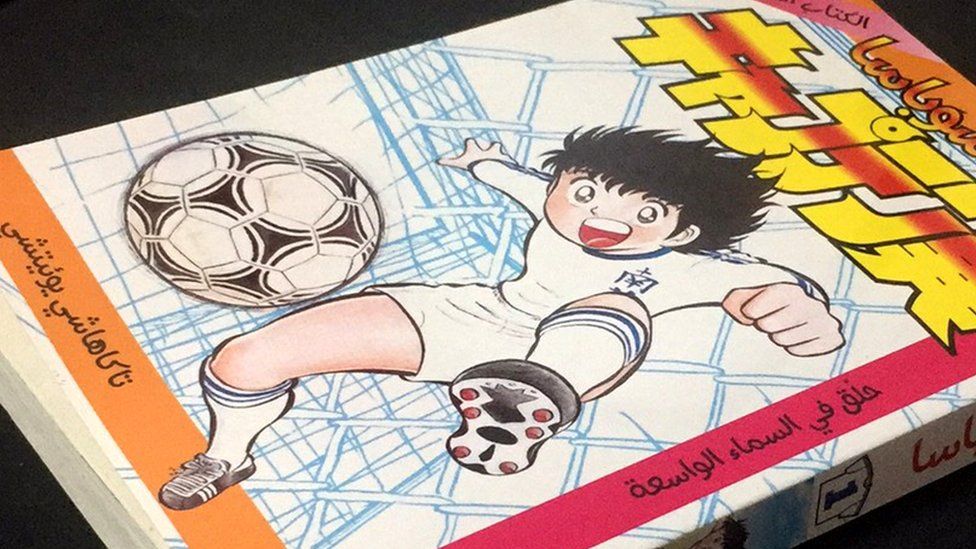The Japanese manga comic helping Syrian refugee children dream
- Published

"The situation in Syria is terrible - so terrible that I think it stops kids from dreaming. But it's their dreams that one day will make Syria good again," says Obada Kassoumah.
"I wish I could just give them a little bit of hope and make them believe that yes, they can have dreams."
Obada is a Syrian student in Tokyo who, by a mixture of chance and determination, has become the translator of Japanese manga comics into Arabic.
And by another twist of fate, many of these Arab editions of football saga Captain Tsubasa have been donated to aid agencies and are being handed out to Syrian refugee children across Europe and the Middle East.
For Obada, the project started as an unexpected translation job but has become something very personal and important.
A narrow escape
As a student of Japanese at university in the Syrian capital, Damascus, Obada received a scholarship to go to Japan for an exchange programme. That was in 2012, and the unrest in the country had already started.
The situation got worse and worse and often he would be stopped by the police in the street suspecting that as a young man he might be a rebel fighter.
When the situation got too dangerous, his parents decided to send him to live with his aunt in Jordan until he could leave for Tokyo.
It was almost already too late - it was only through personal connections that he managed to cross the border.
When his scholarship ended a year later, he was able to stay in Japan by enrolling as a regular student, and picked up a part-time job translating Captain Tsubasa.
"I myself watched Captain Tsubasa as a kid on TV and I loved it," says 26-year old Obada.
"It's a story about a kid having a dream to become a professional football player and working hard to make that dream come true.
"And that's something beautiful, that's something you should make these kids see."
Initially, adapting the books for the Arab market was a mere business decision by a Japanese publisher.
But they were then approached by Prof Masanori Naito, a Middle East specialist at Doshisha University in Kyoto.
Prof Naito had spent several years in Damascus as a doctoral student in the 1980s and was looking for ways to help people affected by the conflict.
He suggested the publisher could donate some of the manga books to refugee kids.
"The tragedy of Syria," he says, "is a very serious concern to me. Back then I worked in villages that are now held by the rebel forces."
The original copyright holders in Japan, Shueisha publishers, were immediately ready to fund the donations, he said.
Through co-operation with a number of international NGOs and Unicef, the books are now being distributed to young Syrian children in camps across Europe, Turkey and the Middle East who have escaped the terror and trauma of the civil war ravaging their home country.
"It is very far from the reality they know," Prof Naito explains. "But for kids it is very important to be able to escape from reality for a while. And these books can also give them some hope for their own future."
Manga he says, could even be "a tool of soft power against despair and radicalisation".
A surprise from Japan
One of the places where Captain Tsubasa now provides a small escape from reality is a refugee home in Berlin where just last week, the copies were handed out by German-Turkish NGO Wefa to around 60 refugees.
"It was really something quite unique and we got a completely different reaction from normal," Ismet Misirlioglu of Wefa told the BBC from Berlin.
"What the children usually get are of course clothes and food and so they were really surprised when we suddenly had Japanese manga books - in their own language," he says, laughing.
"And you really could tell that from their eyes!"
Wefa in Berlin is planning to give out more of the books in the coming weeks.
A duty to help
Back in Tokyo, Obada Kassoumah is still at work putting ever more adventures of Captain Tsubada into Arabic. He is currently translating volume seven out of 37.
For him, going back to Syria is not an option.
Instead, he will stay in Japan for now and finish his degree - he knows Syria will need his skills in the future and he hopes he can have a bigger impact if he works building links between the two countries.
"I have friends who are fighting with the government and other friends who are fighting with the rebels," he says with a heavy voice.
"We are all one family - and now they wish death to each other, trying to kill each other."
But he hopes his translations will put a smile on the face of a Syrian child somewhere, trying to forget the terror of the past.
"As a Syrian it's like my duty to help - and through this thing I can help.
"This way the children can - at least for a bit - forget all the bad memories they have from the war."
- Published2 May 2023
- Published11 March 2016
- Published19 April 2017
- Published28 October 2016